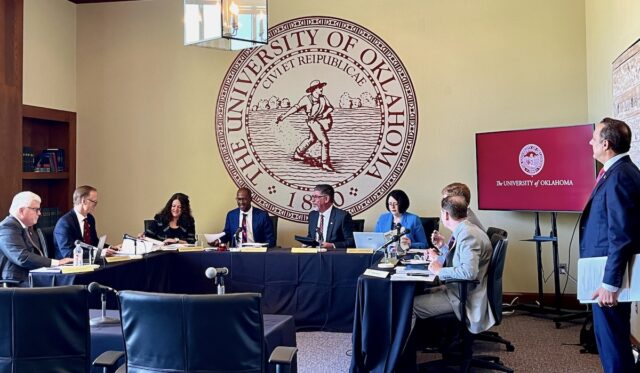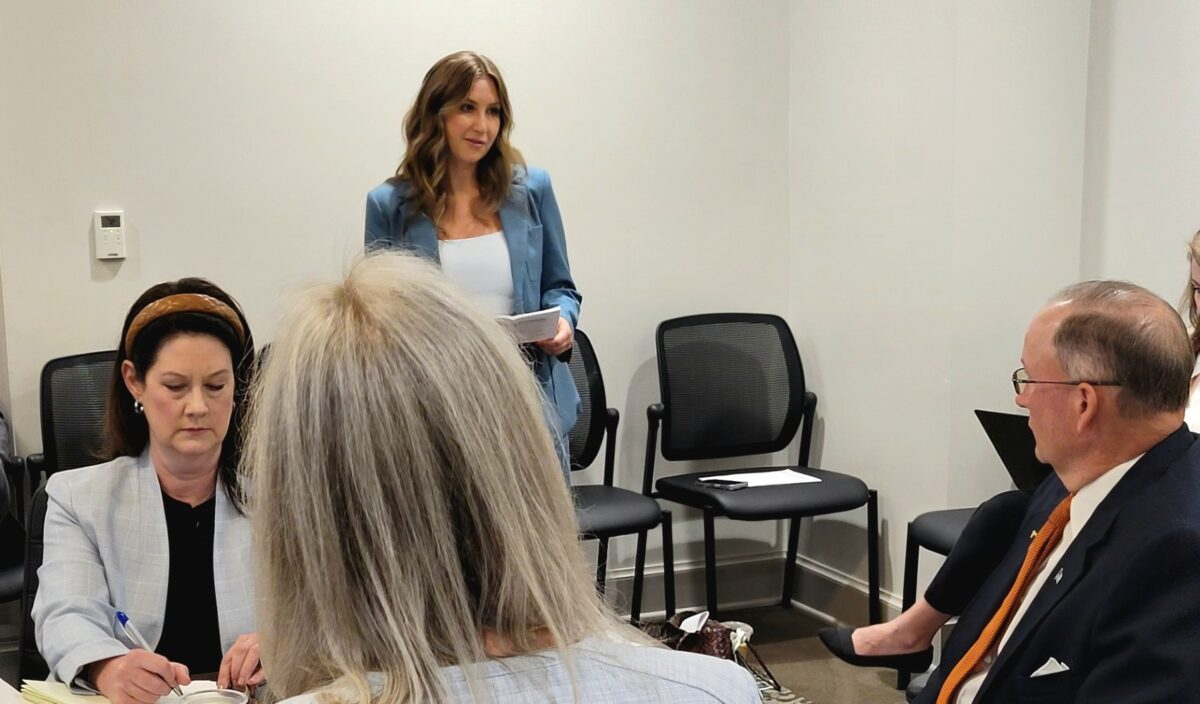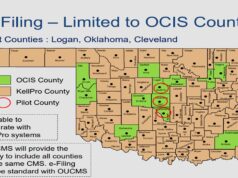

With the football season now in full swing to cause elation and heartbreak for fans across the nation, it can be easy to miss some important Oklahoma news.
In this roundup, get caught up on developments concerning the University of Oklahoma, the Oklahoma Ethics Commission, layoffs at the Cleveland County Sheriff’s Office and more.
Regents approve OU policy changes with no discussion
The University of Oklahoma Board of Regents approved revisions to two significant policies at its meeting in Tulsa on Friday: the Institutional Conflicts of Interest Policy and the Fraud Prevention, Reporting and Whistleblower Policy.
The board also approved a new policy regarding “degree revocation,” which outlines how OU can revoke an individual’s degree when it “has been obtained by fraud or other serious misconduct, including, but not limited to, providing false information on an application for admission, tampering with student records, and other non-scholarly or non-research misconduct activities,” according to an explanation in the board’s Sept. 12 agenda.
Despite the significance of the three policy topics, none received explanation or discussion from OU President Joe Harroz or the regents, who unanimously approved all three policies in 33 seconds.
After the meeting concluded, both Harroz and board Chairman Eric Stevenson indicated that OU general counsel Armand Paliotta could explain the policy changes regarding fraud investigations and conflicts of interest.
“I think they’re updates,” Harroz said. “I think it’s updating to make sure they are consistent with federal law.”
But OU communications officials said Paliotta was unavailable to discuss the changes, and requests for statements or redlined documents showing the changes — as are typically included in the board agenda — only yielded PDF versions of the prior policies and reiteration of their brief agenda descriptions, which included only quoted or paraphrased portions of the policies themselves.
A comparison of the prior Fraud Prevention, Reporting and Whistleblower Policy with the new version indicates seven main revisions:
- The addition of “failure to disclose or concealment of a conflict of interest for purposes of personal gain, including a gain for immediate family” to the definition of fraudulent activities;
- Specification of the phone number — (844) 428-6531 — and web address for the OU Report It! Hotline;
- Specification that “employees may report fraud to the hotline anonymously”;
- Notation that OU employees “also may confidentially report claims of mismanagement and criminal misuse of state funds or property to the Civil Service Division of the Office of Management and Enterprise Services”;
- Adjustment in a list of who shall be alerted when “an investigation reveals evidence that supports a finding of fraud.” The policy now states “the investigative report shall be referred to the executive officer over the area, the president, or the Board of Regents, as appropriate, for corrective action.” Previously, the policy specified “and/or” the Board of Regents;
- Specification that OU’s chief audit executive may conduct “periodic fraud risk assessments”;
- In specifying that the chief audit executive is empowered to “manage the appropriate referral of reports,” the revised policy adds “in consultation with the general counsel as needed.”
The revised Institutional Conflicts of Interest Policy approved Friday involved a broader rewrite and restructuring. Some apparent changes include:
- Specification that required “personal disclosures” made by the president and other “covered officials” at OU “shall be considered confidential, and the information disclosed will be available only to individuals duly charged with the responsibility for review. However, the information may be released in accordance with and as required by applicable law or lawful court order”;
- A requirement that, “no later than 30 university business days after notice of the event giving rise to a real, potential or apparent institutional conflict, the Conflicts of Interest Office of the appropriate campus or his/her designee shall secure information on institutional interests”;
- Establishment that, when a potential conflict of interest is identified and an elimination or management plan is created by a provost and provided to the Institutional Conflicts of Interest Committee, “the president or his/her designee, in consultation with the general counsel, shall have final approval”;
- Stronger language in the “Sanctions” section to say “failure to fully disclose conflicting relationships and/or interests or to follow a prescribed management plan is a serious breach of this policy and may itself be considered research or ethical misconduct.” Previously, the policy said such failure “may be a serious breach”;
- A new caveat in the “Sanctions” section that says punishment for violations shall be “as determined by the president or president’s designees.” That section also adds “abrogation of tenure” as a punishment option;
- A change in the “Sanctions” section about reporting “allegations against an employee for breach of this policy.” Previously, the policy said such allegations “should be reported in a confidential writing to the appropriate provost and, if against a staff employee, the appropriate executive officer.” The new policy says such allegations “may be reported to the appropriate provost or vice president or via any university compliance or ethics reporting hotline.”
Friday’s gathering marked the second meeting in a row where the OU Board of Regents has taken action on major policies. In June, the board approved alcohol policy revisions and the overall transition of OU’s sexual misconduct, discrimination and harassment policies — dubbed the “Institutional Equity Policy” — from regent responsibility to “presidential level” management. The item received no discussion from Harroz or the board.
“Simply, that’s a better place for it at the presidential level,” Stevenson said after the June meeting.
Harroz left the that meeting immediately after its conclusion, but asked what June’s vote on the Institutional Equity Policy means functionally, he discussed the matter Friday.
“It functionally means that I’ll be addressing it. It makes it an ability to adapt to [where the U.S. Department of Education] is that issues it and to deal with the litigation that is taking place right now,” Harroz said, referencing how more than two dozen states have challenged a federal rule expanding the scope of sex discrimination to include gender identity. “As you’ve probably followed, there is litigation over the Title IX component of how it’s handled. [This OU policy management change] allows it to be something we can do once we have a clear authority from the courts on what we are allowed to do. Which I think, probably, we will see turn on the election. But right now it’s with the courts.”
Harroz said OU leaders wanted to switch the Institutional Equity Policy from being regent-approved to president-approved for flexibility, meaning he would be able to make changes quickly “rather than have that issue arise and have to wait for the next board meeting to address it.”
Asked how how members of the public would know about his changes to OU’s policies on sexual misconduct, discrimination and harassment now that they will not be included in public board agendas, Harroz said, “That’s a fair question.”
“Anything we would do, look, we would have to disseminate it to the entire community for a change. So at a minimum, it would be me sending it to all faculty, staff and students,” Harroz said. “Realistically, we couldn’t affect it without publishing it. If you’re either the person who is accusing or the accused, you would have to know what the ground rules were ahead of time to go by. So that’s how we would probably publish any change. And then typically, on some of these items, we do something annually as well.”
Click to review the three policies approved Sept. 20 by the OU Board of Regents.
Norman council approves long-debated entertainment district TIF
After nearly three hours of public comment, the Norman City Council approved a controversial economic development agreement that could spur a new arena for OU basketball and gymnastics, as well as hundreds of millions of dollars in housing and retail developments on land owned by the OU Foundation and other parties on Norman’s northern edge.
While the vote, which occurred shortly after 1 a.m. Wednesday, marks a victory for OU officials and Norman economic development advocates, it obligates up to $600 million of future sales and property taxes through a pair of Tax Increment Finance districts that opponents hope will be rejected through an already-announced referendum petition.
According to the Rock Creek Entertainment District project plan approved 5-4 by the council, the cost of the arena and its associated parking garage is expected to be $190 million, and the city has also pledged $40 million toward infrastructure improvements in the area. But the total authorized project cost is $600 million instead of $230 million because of the city’s commitment to support private developers with debt financing over 25 years.
If the total cost of the arena ultimately goes over $600 million, the private developers, not the city, are responsible for coming up with the extra money, the agreement states. In exchange for the city’s financial contributions toward the arena, the private developers are obligated to build a new entertainment district surrounding the arena. The entertainment district is supposed to include 140,000 square feet of retail and restaurant space, 180,000 square feet of office space, a 150-room hotel, 177 units of single-family housing and “up to” 750 units of multifamily housing. The arena and entertainment district will be located in northern Norman right off of Interstate 35 in the city’s University North Park neighborhood.
“The entire OU family is grateful to the City Council for its leadership, vision, and vote of support,” Harroz, OU’s president, said in a statement. “Tonight’s vote was an important milestone, and we look forward to continuing to work in close partnership with government and business leaders from Norman and Cleveland County to move this project to completion.”
Through a combination of OU and the OU Foundation sources, OU-affiliated entities are expected to contribute $100 million to the project costs. However, it remains unclear what type of annual lease payments the university’s athletic department would make for rental of the arena.
As revealed in documents ahead of the City Council vote, the arena and parking garage portions of the project will be owned by the Cleveland County Recreational and Entertainment Facilities Authority, a public trust created earlier this year. And unlike the city’s prior TIF for the University North Park area, the new TIF does not include an anti-cannibalism provision that would prevent relocated retail operations from having their taxes diverted to the TIF project.
The project has been contentious among Normanites. One study estimates the arena and entertainment district will generate $2.3 billion in direct, net-new spending over 25 years, while 17 percent of commercial activity will be net-new to Cleveland County.
However, another study notes the district will cause “cannibalization,” redirecting consumer spending from elsewhere in Norman, where sales tax would still benefit the general fund as normal, to the new entertainment district, where no sales tax would benefit the general fund until the TIF district expired. Using the figures provided in that study, the city’s general fund and capital expenditures fund would lose $1.26 million in projected revenues beginning in 2031.
Oklahoma’s Local Development Act allows residents to call a referendum election challenging the creation of TIF districts by collecting signatures equal to at least 25 percent of the total votes cast at the preceding general municipal election. Signatures must be gathered and submitted within 30 days of a TIF district’s approval.
While the arena would be used for OU basketball and gymnastics programs, the university is eyeing upgrades to its football facilities, too. At the OU Board of Regents meeting Friday, the board approved $7 million toward developing architectural examination and planning for renovations to the football stadium’s west side.
Quarter Horse Racing PAC fined for failing to disclose political contributions

The Oklahoma Quarter Horse Racing Political Action Committee has agreed to pay $11,000 in civil penalties and costs for violating state ethics rules by failing to report more than $80,000 of contributions to legislative and statewide candidate committees from 2020 through 2023.
The Oklahoma Ethics Commission’s board accepted a settlement agreement during its meeting Friday. The agreement calls for the OQHR PAC to pay a $10,000 civil penalty to the state’s General Revenue Fund and $1,000 to the Ethics Commission to cover attorney fees and costs. The money is to be paid within 30 days.
The OQHR PAC failed to report a total of $84,600 in contributions to candidates in 2020, 2021, 2022 and 2023, according to a notice of allegations sent to the PAC from the Ethics Commission.
Also, as part of the settlement, the OQHR PAC agreed to send its officers within one year to an Ethics Commission continuing education program related to PACs.
The notice of allegations sent to the OQHR PAC in June notes that the treasurer is responsible for filing reports of contributions and expenditures. According to its statement of organization filed with the Ethics Commission, the executive director of the Oklahoma Quarter Horse Racing Association serves as treasurer for the OQHR PAC.
Krissy Bamberg has been OQHRA’s executive director since May 2021. Asked to respond to the settlement, Bamberg said in an email that she has no comment at this time.
In 2021, Kole Kennemer served as the association’s executive director and PAC treasurer until he resigned in May of that year. He was hired in January 2019 after the death of longtime OQHRA executive director Debbie Schauf.
Before being named OQHRA executive director, Bamberg — who is Schauf’s daughter — worked since 1999 in the association’s Edmond office. In 2019, she was named special events coordinator and race administrator.
Most of the contributions not reported by the OQHR PAC occurred in 2020 when it failed to report $61,100 given to 116 legislative candidates, including Republicans and Democrats seeking seats in the Senate and the House of Representatives. All but one of the contributions were for $500. A contribution of $1,000 was given to Rep. Dell Kerbs (R-Shawnee).
In 2022, the OQHR PAC failed to report contributing $12,500 to four Republican statewide candidates: $2,500 each to then-Attorney General John O’Connor; AG challenger Gentner Drummond, who was elected to the post that year; and Lt. Gov. Matt Pinnell; and $5,000 to Gov. Kevin Stitt.
The OQHR PAC in 2023 failed to report contributing $9,000 to six legislators: $1,000 each to designated House Speaker Kyle Hilbert (R-Bristow); designated Senate President Pro Tempore Lonnie Paxton (R-Tuttle); and Trey Caldwell (R-Lawton), who is the vice chairman of the House Appropriations and Budget Committee; Rep. Tammy Townley (R-Ardmore); Kerbs; and Kurt Murray, of Stillwater, who withdrew ahead of the June Republican primary for the open Senate District 21 seat.
In 2021, the OQHR PAC failed to report contributing $500 to each of four legislators: Rep. Kevin McDugle (R-Broken Arrow); Sen. Chris Kidd (R-Waurika); then-Sen. John Michael Montgomery (R-Lawton); and Rep. John Waldron (D-Tulsa).
The OQHR PAC is a limited committee, which means it is required to file quarterly reports of contributions and expenditures, according to the Ethics Commission.
Campaign funds may be used for caregiving expenses

Political candidates and elected officials may spend campaign funds on childcare or other caregiving expenses, according to an interpretation of rules approved by the Oklahoma Ethics Commission.
Commissioners voted 4-0 on Friday to state that Ethics Commission rules allow for using contributions to a campaign committee to pay for dependent care expenses as an ordinary and necessary expense. The change takes effect immediately.
Campaign funds may be spent for caregiving expenses when:
- The candidate or officeholder has primary caregiving responsibility for a dependent, such as a dependent child or an elderly parent;
- The candidate or officeholder needs to have the dependent cared for to allow the candidate or officeholder to attend or participate in an event that would not exist but for the campaign or officeholder’s position; and
- The costs associated with caring for the dependent would not be incurred if there were no campaign or office holding.
Sen. Jessica Garvin (R-Duncan) requested the commission look at whether dependent expenses could be considered expenses associated with campaign activity and holding public office.
“When I ran for office, I was fortunate to have an incredible support system who helped with our children while we were spending 10-12 hours a day knocking doors; not every candidate has that same type of village,” Garvin said in a statement. “I am incredibly proud of the Oklahoma Ethics Commission for their decision regarding campaign finances and childcare, and believe this demonstrates the commitment we have in Oklahoma to ensure less barriers exist for young families to be engaged and involved in civics and government.”
Sarah Hague, chief program officer of the Vote Mama Foundation, appeared before the commission to request that campaign funds be eligible for dependent care expenses.
“Childcare obligations are one of the major factors that families consider when making their decision to run for office,” Hague said. “In many states, it costs more to send an infant to childcare than it does to make a mortgage payment. And this is just not an expense that working families can take on, especially while running for office.”
The Vote Mama Foundation is the only organization advocating to pass the usage of campaign funds for childcare in all 50 states, Hague said. In 2018, the organization in 2018 made an initial request to the Federal Election Commission to allow federal candidates to use their campaign funds on childcare, she said. Now, the organization is requesting states to do the same.
“To date, 33 states have allowed the use of campaign funds to be used on childcare expenses,” Hague said. “And since 2018, we’ve seen over a 2,000 percent increase in usage by state candidates. Over $1 million has been spent by federal and state candidates on childcare expenses. And to date, we’ve seen no instances of abuse.”
Cleveland County Sheriff’s Office lays off staff
In the midst of budget woes, the Cleveland County Sheriff’s Office announced a round of layoffs Friday. A statement on Facebook from the agency said the layoffs are “primarily affecting administrative staff, with some impact on deputies,” while patrol and detention staffing retention will be prioritized. According to News 9, 24 staff members have lost their jobs, while six others were reassigned.
To further reduce costs, the sheriff’s office will begin using Cleveland County’s IT and HR departments and will sell surplus assets, according to the Facebook post. The agency will shift its patrol focus to unincorporated areas and incorporate cross-training with other emergency response agencies.
In a statement released Friday, the Cleveland County Board of Commissioners said Sheriff Chris Amason’s agency overspent its 2024 fiscal year budget by $4.5 million. In June, commissioners approved $3.2 million to get the agency through the end of the year. Although commissioners needled Amason by dubbing it a “bailout” fund, he was reelected against multiple challengers in June.
Commissioners have reported that, since Amason took office in 2020, his office has seen a turnover of 315 personnel.
“The Cleveland County Board of County Commissioners is saddened to learn that more valued employees are losing their jobs,” Commissioners Rod Cleveland, Jacob McHughes and Rusty Grissom said in a joint statement. “These layoffs are the consequence of mismanagement and previous decisions made by Sheriff Amason, which have affected the operations and stability of his department.”
Report: Grand jury investigating Ryan Walters

On Monday, Nolan Clay of The Oklahoman reported that “multiple sources,” who were not named, had confirmed Oklahoma’s multi-county grand jury is investigating State Superintendent of Public Instruction Ryan Walters over his handling of federal pandemic relief money. NonDoc has also been able to confirm the inquiry.
Attorney General Gentner Drummond indicated shortly after taking office in January 2023 that he intended to investigate “state actors” for the possible misspending of millions of dollars. The multi-county grand jury meets at the office of the attorney general, which also advises the body of citizens tasked with hearing evidence from prosecutors around the state. A grand jury can order subpoenas, issue indictments and write reports about situations investigated in front of it.
Walters, for his part, has insisted the Florida-based software company ClassWallet is to blame for at least some of the misspending of funds. Walters contracted the company to administer $39 million in the federal Governor’s Emergency Education Relief Fund. At the time, he was Gov. Kevin Stitt’s Secretary of Education and the executive director of Every Kid Counts Oklahoma.
Low-income families eligible for one of the two GEER programs meant to provide money for educational materials for kids at home during the pandemic could use ClassWallet to purchase those materials online. Reporting from The Frontier and Oklahoma Watch, along with state and federal audits, has shown that families were able to purchase gaming consoles and other non-educational products through the system.
The multi-county grand jury meets for up to three days each month during its regular 18-month term. Its next session is scheduled for Oct. 8-10, according to The Oklahoman.
As questions about Walters and the multi-county grand jury abound, the attorney general’s office — where the jury meets — appears to be tightening security. Last week, the office implemented a new policy effectively barring anyone who does not have an appointment or other approval from entering the building. Previously, members of the public were allowed to sit in the office’s lobby, and Clay became known for doing so on days that a grand jury was meeting.
Phil Bacharach, the agency’s director of communications, said the new policy is unavailable for review because it is currently in draft form. He said it should be finalized sometime next week.
Woman acquitted of obstruction charges after protest at Trump rally

A woman acquitted by a jury last week on charges of obstructing a police officer at a 2020 rally for Donald Trump in Tulsa will likely resume a civil lawsuit against the City of Tulsa, her attorney said.
Sheila Buck, 67, went to downtown Tulsa for Trump’s 2020 reelection rally at the BOK Center to protest. Wearing a t-shirt proclaiming, “I Can’t Breathe,” Buck was arrested after campaign staffers asked police to remove her from the area. Buck was found not guilty Sept. 10 of misdemeanor obstruction charges.
Buck’s civil lawsuit alleges the City of Tulsa violated her First, Fourth and 14th Amendment rights.
“This is not a partisan issue,” Buck’s attorney told NPR last week. “This goes to every single American’s civil right to voice their opinion in a public forum and not be arrested for it.”
Oklahoma County Jail loses health care provider

Turn Key Health, a longtime health care provider at the Oklahoma County Jail that operates clinics inside jails in 10 states, will be out of the facility by early October after the company informed the jail trust it would no longer serve the facility because of what it said were inadequate staffing levels at the jail, according to a report from The Frontier.
In its letter, the company said low staffing levels prevented its employees from adequately accessing its patients.
That leaves the county’s jail trust about a month to find a new vendor. While Turn Key has blamed the issue on jail staff, the company has had numerous problems in recent years. A July 2024 investigative report by the Marshall Project found that at least 50 people had died under Turn Key’s care in the last decade, including some at the Oklahoma County Jail.





















